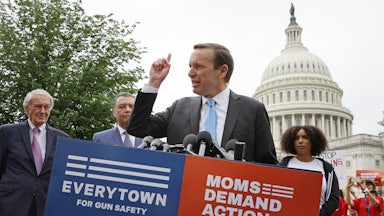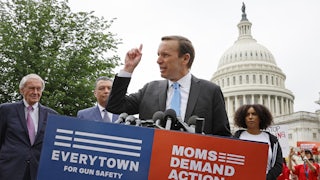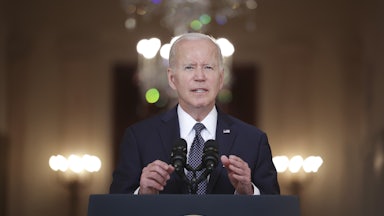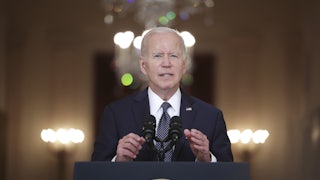Weeks after a pair of devastating massacres in Buffalo, New York, and Uvalde, Texas, roiled the nation and brought newfound attention to America’s ever-present gun violence crisis, members of Congress are still mulling how best to prevent mass shootings. How that mulling is going, and at what velocity, depends on where you are in the Capitol.
House Democrats are pressing forward this week with action on gun safety legislation, even as their proposals are essentially dead on arrival in the evenly divided Senate. Meanwhile, senators are slowly working to reach some kind of agreement that could obtain the support of at least 10 Republicans—a perennially difficult task that has doomed numerous pieces of legislation in recent months.
The House, nevertheless, on Wednesday passed a package of gun safety legislation that would raise the age limit for purchasing semiautomatic rifles from 18 to 21, ban large-capacity magazines, crack down on ghost guns and bump stocks, and incentivize safe firearm storage. The package of bills received some Republican votes, although most GOP representatives considered the measures to be an instance of federal overreach that infringed upon Second Amendment rights. (Democrats also passed a resolution condemning the racist violence in Buffalo and the “great replacement” theory along party lines.)
Democrats argue that passing such legislation would help keep the pressure on the upper chamber; in a rally with advocacy groups on the National Mall on Wednesday morning, Senator Chris Murphy said that action in the House will spur the Senate to “do the right thing.” He also highlighted the bipartisan talks with Republicans, saying: “We are only going to move forward with legislation that saves lives.”
The House will also vote this week on a bill introduced by Representative Lucy McBath, whose son was shot and killed in 2012. Her proposal would allow law enforcement and family members to obtain extreme risk protection orders from federal courts that would temporarily remove firearms from people who pose a threat to themselves or others. This would amount to a federal version of the “red flag” laws that have been adopted by 19 states. Other provisions in the bill written by Representative Salud Carbajal would use Justice Department grants to incentivize states to enact their own red flag laws.
When asked by The New Republic whether she would be able to accept narrower legislation from the Senate, McBath said that “any movement is positive movement.” “We will accept any positive movement because we know there’s not just one particular way, one particular piece of policy that’s going to make a dent in the extremist gun culture that we live in,” McBath said. “We know it’s going to take years of continued work going forward.”
Meanwhile, a bipartisan group of senators huddled in the bowels of the Capitol as they tried to reach a deal on legislation that could be mutually agreeable to both parties. Any legislation that comes from their efforts will likely be exceedingly narrow, taking only incremental steps in confronting the problem of gun violence. The primary focus of this group includes taking juvenile records into account when conducting background checks, incentivizing red flag laws on a state level, beefing up school security, and funding mental health care.
But senators emerged from their hourlong meeting on Wednesday afternoon with conflicting timelines about when such a deal might be reached. While Democratic Senator Chris Coons expressed hope that a framework could be reached this week, GOP Senator John Cornyn countered that “arbitrary deadlines are not our friend.”
“I think it’s reasonable to expect in the next couple weeks, maybe this work period, that that would be—I’m just speaking for myself—an aspirational goal,” said Cornyn, who as a conservative from Texas is playing a key role in reaching a deal that could appeal to a larger number of Republicans. “But obviously, we have 100 senators who are free agents, and they can do anything they want on whatever timetable. So that’s all it is, an aspirational goal for me personally.” (There have been roughly two dozen mass shootings already in the weeks since the massacre in Uvalde.)
However, Cornyn said that despite some “sticking points,” he believed “everybody’s talking in good faith, and I think they’re sincere about wanting to achieve a result.”
Murphy later told reporters that he agreed with Cornyn that a deal should be reached “this work period,” that is, before Congress leaves town again for the July 4 holiday. “In order to do that, we need to move expeditiously. But this would be a big historic deal, and we need to get it right,” Murphy said. Getting it right is so critical because bipartisan negotiations on gun safety legislation have fallen apart time and time again—the closest the Senate came to expanding background checks occurred in 2013, after the elementary school shooting in Newtown, Connecticut, and that measure failed in the Senate by just a few votes.
The price tag of an eventual deal will also be important in garnering support from Republicans, and GOP Senator Thom Tillis said the group was already discussing cost. Republican Senator Bill Cassidy said that 80 percent of what they wanted to do on mental health had been figured out. “There’s the most common ground around the mental health spending because it’s not as complicated politically,” Murphy told reporters.
Carbajal told The New Republic that he thought the Senate negotiations represented important progress.
“It’s unfortunate it’s taken this long after tragedy after tragedy after mass shooting after mass shooting, but I’m encouraged that those discussions are going on now,” said Carbajal, whose sister died by suicide with a gun when he was a child. “I’m certainly disheartened that we’re not doing more but encouraged, at the same time, that once and for all, we are moving some efforts forward to address gun violence with commonsense gun safety.”
But a Republican congressman, Representative Chris Jacobs, sounded a more dour note. Jacobs, who represents a district bordering Buffalo, announced that he would not run for reelection after he received blowback for voicing support for an assault weapons ban. When asked by The New Republic, ahead of the House votes on the gun safety package, whether he thought the Senate was going far enough to address the issue, Jacobs said: “They’re certainly not addressing even some of the things we’re doing today. So I think the answer would be no.”
Murphy addressed the relatively limited nature of the talks, telling reporters on Wednesday evening that he spends “every day talking to victims and parents of victims who can’t understand why we aren’t doing more.” “But I think the only option now is to act and to make progress. I don’t think any of these parents will accept nothing as an answer,” he said.
The activity of the day was underpinned by wrenching testimony before the House Committee on Oversight and Reform by victims, witnesses, and family members of survivors of the shootings in Uvalde and Buffalo. Roy Guerrero, a pediatrician in Uvalde, said he would “never forget” the horrors he saw in the emergency room after the shooting, describing two children “whose bodies had been so pulverized by the bullets fired at them over and over again, whose flesh had been so ripped apart, that the only clue as to their identities were the blood-spattered cartoon clothes still clinging to them.”
“Innocent children all over the country today are dead because laws and policy allows people to buy weapons before they’re legally old enough to even buy a pack of beer,” Guerrero said. “They’re dead because restrictions have been allowed to lapse.”
The parents of one of the children who was murdered, Lexi Rubio, also testified, describing her lost dreams. “We understand that for some reason, to some people, to people with money, the people who fund political campaigns, that guns are more important than children,” said Kimberly Rubio, Lexi’s mother, who called for a ban on assault weapons and high-capacity magazines.
In a second panel before the committee, Joseph Gramaglia, the police commissioner of Buffalo, described an armed officer who was killed trying to protect customers. Aaron Salter was a “good guy with a gun,” Gramaglia said, but he “was no match for what he went up against, a legal AR-15 with multiple high-capacity magazines.” (Republicans on the committee appeared unmoved by the testimonies; Representative Andrew Clyde argued that “evil deeds do not transcend constitutional rights.”)
The House is expected to take up an assault rifle ban soon, but the legislation is unlikely to pass the Senate. While some GOP senators have expressed openness to raising the age limit to purchase an assault weapon from 18 to 21, it is unclear whether such legislation could garner the 10 necessary Republican votes.
Senator John Thune, the Republican whip, indicated that he believed raising the age to purchase an assault weapon could be addressed on a state-by-state basis, noting that the Republican-led state of Florida had done so but arguing that in his own state of South Dakota, with its “long history of law-abiding citizens responsibly exercising their rights,” such an age limit might not be necessary. “You’ve got to think long and hard any time you’re going to restrict or limit someone’s constitutional rights,” he said.










